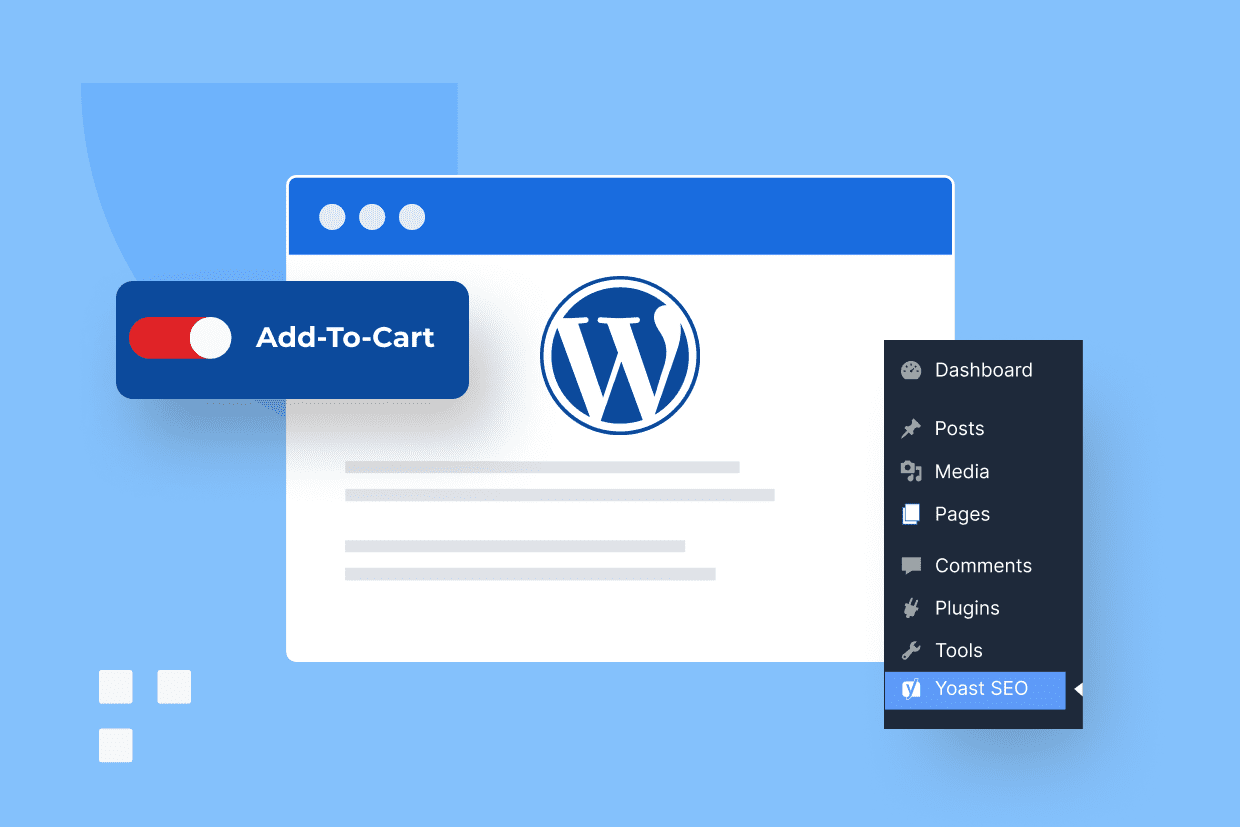Key highlights
- Discover the key differences and choose the platform that aligns with your blogging goals for 2025.
- Learn which platform i.e. WordPress vs Blogger offers superior features, flexibility and monetization options for modern bloggers.
- Step-by-step guidance to install WordPress and set up a self-hosted WordPress site with minimal effort.
- Compare WordPress vs Blogger features, from customization options to SEO tools, to make an informed decision for your blog.
- Choose the right web hosting plan to maximize performance, security and scalability for your blog.
Blogger and WordPress are two well-known blogging platforms used to post content online. If you’ve heard of both, you might be wondering which is better suited to your priorities. Whether you’re trying to choose the best blogging platforms 2025 or deciding between Blogger vs WordPress for making money, one of the two systems will likely be a significantly better fit for your goals.
Picking the right content management system (CMS) is vital. And out of all forms of content, blogs still earn the highest return on investment (ROI) of any marketing channel, tied with influencer marketing and social media shopping tools.
This makes blogging a gold mine, but you can only capitalize on that ROI by using a platform that is approachable, includes the tools you need most and caters to your content goals.
Choosing the right platform whether it’s Blogger vs WordPress, a free blogging platform or a WordPress site can have a direct impact on your SEO, monetization options and overall growth.
This in-depth Blogger vs WordPress guide will lay out the differences between each platform and describe the similarities they share, providing all the information needed to choose the ideal blogging platform for you.
Blogger vs. WordPress: Introducing each
Before jumping into a detailed comparison, let’s have a brief overview of each blogging platform so you can clearly see the differences between Blogger vs WordPress.
Blogger explained

Blogger.com is a user-friendly, straightforward, open-source blogging platform that’s been around since 1999. It’s used by less than 1% of all websites, but it’s still a reliable option to easily and speedily start a blog.
For those exploring what are the best free website builders or comparing a Blogger blog to a WordPress blog, this section will provide clarity.
Is Blogger a good platform?
Yes. Blogger is ideal if you want a free blogging platform with an easy setup, basic functionalities, simple security and straightforward monetization. It integrates seamlessly with Google services such as Google Analytics and Google AdSense, making it beginner-friendly.
For those planning to grow a business, run a self-hosted WordPress site, implement advanced features or improve search engine rankings, Blogger may not offer the flexibility needed.
WordPress explained

WordPress is the most popular website platform, used by 43.1% of all websites. There are two versions of WordPress: WordPress.com and WordPress.org.
WordPress.org is an open-source software you can download to build a self-hosted website. That means you’ll need to buy a domain name and a WordPress hosting service from providers such as Bluehost. The WordPress.org software supports a ton of features and options to personalize your themes, add-ons, web code and hosting plan.
In contrast, WordPress.com is more comparable to Blogger — it’s free, web-based, comes with a domain name and you can create a website in minutes, albeit with limited customizability.
To be clear, this guide will primarily compare Blogger to the web-based service WordPress.com.
Is WordPress good for blogs?
Yes. WordPress is a reliable platform for starting a WordPress blog and managing content efficiently. Using WordPress.org or the paid version of WordPress.com gives access to nearly unlimited functionalities, including premium themes, SEO plugins and integrations with Google services like Google Analytics.
Whether you want to create a membership site, an ecommerce store or just a simple blog, WordPress offers extensive customization options and control over your website.
Its flexibility makes it ideal for maximizing ROI from blogging, running ads via Google AdSense or expanding your WordPress site with additional features.
Setup and ease of use
How simple is the setup process for Blogger vs WordPress and how user-friendly are the services each platform provides?
Blogger

Blogger provides an effortless out-of-the-box setup, making it an excellent option for beginners who want a simple blog without advanced customization. The simple design and Google integrations make Blogger super easy to use.
To create a Blogger blog, sign in with your Google account and select the Create New Blog option.
You can then select a display name and pick a title for your blog. Next, choose whether you’ll stick with a free URL within the Blogspot subdomain, buy a domain through Google or use a custom domain name you own.
Next, select a design theme. Blogger offers a limited set of free templates and add widgets or build pages to adjust layouts.
Blogger is part of the Google ecosystem. This means Google handles updates, security patches, hosting and more, making the blog setup and management process less intensive.
WordPress

WordPress requires a bit more effort on the front end. You won’t need coding knowledge, but there are more decisions to make and features to set up before your WordPress blog is ready.
First, you’ll fill out a signup form and create an account. Next, you’ll enter your goals, select a website name and pick a free domain name, within the WordPress subdomain. The paid version unlocks using a custom domain you own.
Choose a blog title and a free domain within the WordPress subdomain or upgrade to a custom domain for full branding. Then pick a homepage design and navigate to the dashboard.
From there, you can select a WordPress theme, customize pages and install WordPress plugins to enhance functionality.
The WordPress setup process offers more flexibility and control, allowing you to create anything from a basic blogging site to a membership site or ecommerce store.
For guidance, take advantage of free tutorials, webinars and courses offered by the WordPress community.
Design and customization options
How much control will you have over your blog with Blogger vs. WordPress? Which elements can you alter on each platform and what style options do you have?
Blogger

Blogger is designed for simplicity rather than control; it’s light on customization and flashy style options.
You can choose from a small library of basic templates and change a few elements. There are no built-in premium themes, but you can pay for third-party templates, then import them.
Examples of things you can alter include:
- Color schemes.
- Layouts.
- Backgrounds.
- Fonts.
- Column width.
That being said: If you have some coding experience, you can edit HTML and CSS directly on Blogger. Doing this gives you far more possibilities for personalizing your free blog.
WordPress

WordPress truly shines when it comes to customization possibilities. You can choose over 10,000 looks from the WordPress themes both free and premium themes and customize them using the WordPress block editor, a drag-and-drop page builder.
You can also install WordPress plugins to enhance functionality and add new features, whether you want a membership site, an ecommerce store or a self-hosted WordPress site.
WordPress is incredibly flexible. It allows you to alter almost any aspect of your website on the front end to match your vision, without coding expertise.
With WordPress, you have complete control over your website’s appearance and layout, including custom menus, banners and visually appealing widgets.
While the platform offers unmatched flexibility, this also comes with a steeper learning curve. When deciding between Blogger vs WordPress.
Features and functionality
What can you do with each platform? Are one platform’s tools better than the other’s?
Blogger

The Blogger platform offers a limited range of features, which can be enhanced using premade gadgets. Examples include search bars, contact forms and Google reviews.
This setup works best for a simple blog rather than a full content management system, as it provides fewer options for advanced functionalities.
Blogger does not support plugins like WordPress and there’s no self-hosted WordPress option, so you rely entirely on Google’s servers for hosting.
Blogger integrates with Google Analytics to track your blog posts and engagement. With this, you can:
- Get real-time reporting on your website’s performance.
- Gain insights on which content increases metrics like engagement, conversions and retention.
- Learn about emerging trends, crucial pattern shifts and future growth opportunities.
- Increase your understanding of how your audience prefers to consume content.
WordPress

WordPress offers extensive features that make it highly versatile for bloggers. Even the free version of WordPress software comes with built-in tools like:-
- Contact forms.
- Time machine for post edits.
- Spam protection with Akismet.
- Newsletters and Really Simple Syndication (RSS) are built in.
- Visitor statistics via the dashboard.
Upgrading to a paid plan unlocks more functionalities: you can install WordPress plugins to add advanced features, use free and premium themes, schedule WordPress posts and create any type of site from a membership site to building an ecommerce store.
With WordPress block editor or the WordPress content editor, you can easily customize your pages and design, giving complete control over your website.
The flexibility of WordPress makes it suitable for both beginners and professionals aiming to manage a sophisticated blogging service.
The possibilities really go on and on. This platform’s functionalities are more comprehensive.
SEO and marketing capabilities
How does each platform help you reach an audience with blog posts? Which aspects of marketing, promotion and search engine optimization (SEO) can be accessed by Blogger vs. WordPress?
Blogger

This blogging platform has standard SEO tools but isn’t tailored to help your blog posts rank high on search engine rankings.
Some of the SEO tweaks it does offer include:
- Permalink customization
- CSS tag alteration
- Page element tag personalization
- Widget tag personalization
Blogger won’t hold your hand through SEO — if you want to boost your page rank, you’ll need at least a basic knowledge of search engine optimization. If you can code, altering CSS tags will also help optimize your Blogger blog.
Blogger platform does have some helpful marketing capacities. It has built-in media-sharing features and you can add email subscription links and other engagement tools by using gadgets. And Blogger has a direct connection with Google AdSense, so you can earn money from page views and manage your adsense account effectively.
WordPress

This blogging platform wins when it comes to both on-page and technical SEO. It’s fast, optimized for mobile and works perfectly with the WordPress block editor and WordPress content tools. Even if you use the free blogging service of WordPress.com, you get SEO-enhancing elements such as:
- Permalink customization, custom titles and descriptions
- Website verification
- Streamlined smart URL redirects
- Automatic social media shares
- Auto-generated XML sitemaps, which help search engines crawl and index your WordPress posts
With any paid WordPress hosting plan, you can download a range of useful SEO plugins that instantly optimize your WordPress site.
For example, HubSpot’s SEO plugin will boost a blog’s page rank, as will Yoast SEO and MonsterInsights.
Since organic search is the most important source of traffic for bloggers, optimizing your blog content with SEO tools and WordPress plugins is vital.
WordPress offers a great range of free, marketing-oriented features such as automatic social promotion tools, contact forms and newsletters all accessible with just a few clicks.
Security and customer support

How secure are websites on Blogger vs. WordPress? How much customer support will you get while using each platform?
Blogger
With a Blogger site, Google manages security specifications for you. This makes it reliable and secure compared to other platforms, as Google applies constant updates, patches and a web application firewall.
Security Blogger features ensure fewer vulnerabilities and protection against malware. However, you’ll need to handle backups yourself.
You won’t get one-on-one support for your Blogger blog. You can search the Blogger Help Community or rely on Google Docs tutorials and forums for guidance, but dedicated support is limited.
For many users, a simple free blogspot subdomain is enough to start blogging, though support options remain basic.
WordPress
If you use the free version of WordPress.com, the default security specs aren’t as comprehensive as Blogger’s security. WordPress software provides key protections like brute-force protection and strong encryption. Otherwise, you’ll need to manage security yourself.
If you pay for a business or commerce account, you can access real-time backups and install WordPress plugins focused on security to level the playing field.
Customer support isn’t provided with the free version. On the other hand, official WordPress has a massive community of users who create webinars, forums and tutorials.
These valuable resources help you enhance website security, fix errors, manage blog settings and handle most changes you’ll ever make.
Pricing and monetization
Both platforms are free to start, but what will your actual costs be if you opt for Blogger vs. WordPress?
Blogger

Blogger gives you everything it has, completely free. There are no hidden costs. It also offers a free blogspot subdomain if you’re okay with the URL ending in .blogspot.com. Because it’s part of Google’s servers, hosting, security and Google Analytics come free of charge.
Additionally, Blogger provides a quick route to monetization. It’s easy to integrate your adsense account, which puts ads on your blog posts and automatically manages which ones show. Even beginners can use these monetization options effectively.
WordPress

WordPress.com is free, unless you upgrade to a paid version. If you pay annually, plans start from:
- $4 per month for personal.
- $8 per month for premium.
- $25 per month for business.
- $45 per month for commerce.
Free hosting is included in all plans and your custom domain name is free for the first year if you pay annually.
While WordPress doesn’t immediately integrate with a monetization platform, it can be monetized using the right WordPress plugins and monetization options.
With paid versions, you can sell branded products, make your blog subscription-based, require payment for certain content, start an affiliate program or offer sponsored posts. You also have the option to apply for WordAds, WordPress’s version of AdSense.
Blogger vs. WordPress: Which platform is right for you?

The best blogging platform for you depends on your needs.
Choose Blogger if you:
- Want your blog launched and monetized with unrivaled speed.
- Prioritize simplicity and ease of use above all else.
- Prefer using HTML and CSS to personalize your website.
- Plan to alter only basic SEO elements.
Choose WordPress if you:
- Plan on expanding your business, your audience and your services.
- Want a rich set of features and don’t mind the subscription prices.
- Prioritize control over your blog.
- Enjoy customizing webpages to the maximum.
- Intend on boosting SEO for your website.
Final thoughts
The WordPress vs Blogger debate is tricky because both are free, simple, customizable and monetizable. But when you look closer at Blogger comparison versus WordPress comparison, the differences become clear.
If you want the easiest setup, a simple blog and have some coding knowledge, then Blogger might be the best fit.
However, if you’re seeking more customization options, advanced features via block editor and control over your web hosting, install WordPress to gain the full capabilities of a self-hosted WordPress site. This allows you to compare WordPress features directly with Blogger and create a site that meets your exact goals.
Choose WordPress if you want total control over your customization options and the flexibility to manage your site, themes and blog content with ease.
If you decide that WordPress.org is perfect for you, the next step is getting top-notch WordPress hosting services through Bluehost. Our team of experts is available 24/7/365 to answer questions and provide support as you navigate growing your blog.
FAQ
Blogger is still active, secure and reliable for blogging. However, its lack of features and customization options makes it outdated. It’s not as versatile as WordPress software, which provides far more flexibility for modern blogging.
Yes. It’s 100% free unless you purchase a WordPress theme or other self-hosted WordPress solutions. While you won’t have as much control as a WordPress blog, Blogger is a good platform for a simple blog without extra costs.
WordPress vs Blogger differs significantly in monetization. Blogger offers instant, easy monetization with a free blogging service and a direct AdSense account, but the audience reach is limited. WordPress offers wider monetization options, especially with paid plans, plugins and hosting plans that support subscriptions, online stores or affiliate programs.
Absolutely. It’s easy to start a blog with any version of Blogger or WordPress. Blogger comes with a simpler setup but offers less control over your blog. WordPress comes with a learning curve but offers more possibilities.




Write A Comment